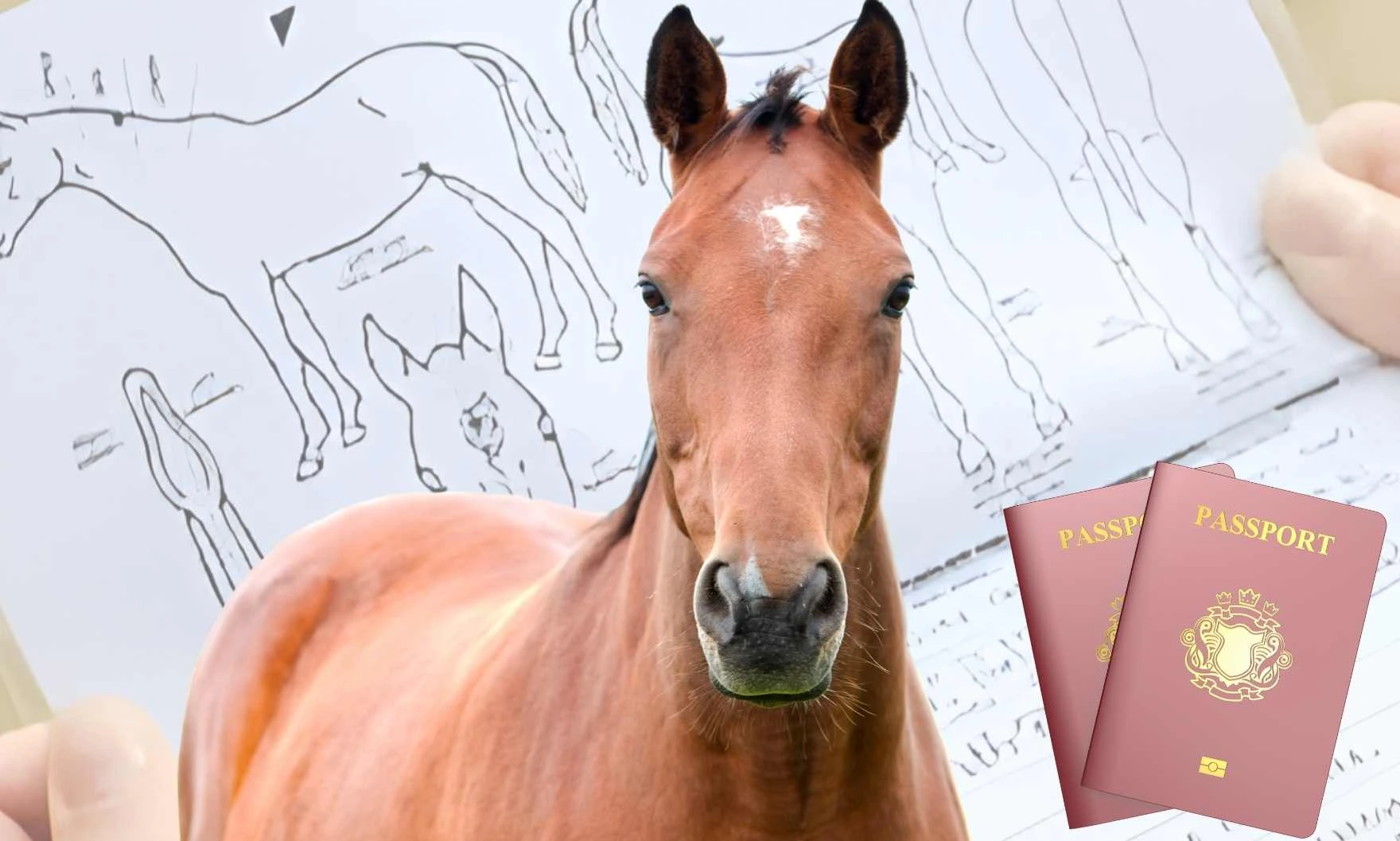You must understand the importance of having every document in perfect order for efficient equine transport. A horse passport (also called equine passport) is an essential document that not only identifies your animal but also helps you to be in compliance with regulatory standards.
In this comprehensive post, we outline every critical step, from understanding when you need a horse passport, how to apply to updating, replacing, and using it for international equine relocation.
Let’s dive into it.
Horse Passport: What is it?
To put it simply, a horse passport is a document or record that:
- Details the animal’s breed, color, and species
- Tracks all vaccinations
- Identifies the registered owner
Horse Passport - Importance
A horse passport serves as the official identification document for your horse, detailing its information such as breed, color, species, and vaccination records. Having a complete and up-to-date passport is key for both legal compliance and the health management of your equine fellow.
When is a Horse Passport Required?
An equine passport is mandatory for every eligible equine. We require that each animal in your care must have a valid passport that accompanies it at all times. Whether at the stable or during transportation, it is essential to have this document readily available.
Horse passport or equine passport is required for:
- Horses
- Ponies
- Donkeys and Asses
- Zebras
- Mules, Hinnies, or Other Hybrids
For those who keep semi-wild ponies on designated areas such as Dartmoor, Exmoor, Wicken Fen, or the New Forest, a passport is necessary if the animals are not free-roaming or receive veterinary care. The passport is critical for identification during veterinary checks, transfers of ownership, and travel.
This requirement ensures that veterinary treatments, inspections by animal health or trading standards officers, and sales processes are conducted smoothly. Not having the passport on hand can result in fines and regulatory issues.
How to Apply for a Horse Passport?
-
1. Applying Early for Compliance
For any equines in your possession, we recommend applying for the passport well before the animal reaches 12 months of age. Early application offers the peace of mind that the passport is ready when it is most needed.
-
2. Apply through Passport Issuing Organisation (PIO)
We suggest getting it from the Passport Issuing Organisation (PIO). If your animal is a pedigree horse, it is important to register with a PIO that manages studbooks. The PIO will guide you through the entire application process.
-
3. Microchipping: The First Critical Step
Before the application can be submitted, a microchip must be implanted in your horse by a certified veterinarian. The microchip serves as a unique identifier and is a mandatory requirement in most jurisdictions. We advise scheduling a veterinary appointment as soon as possible to complete this crucial step.
-
4. Submission of Application
After the microchip implantation, complete the necessary forms and gather all supporting documents. The application must be submitted by the later of these two dates:
- 30 November of the animal’s birth year.
- Within 6 months of the animal’s birth.
Applications can take up to six weeks to process. We recommend submitting early to avoid delays, especially if you plan on using your horse for competitive travel or international movement.
-
5. Handling Late Passport Issuance
A passport issued after 12 months of the animal’s birth is considered late. In such cases, the passport will be issued as a duplicate or replacement. You must note that a late-issued passport restricts the use of the animal for human consumption, thus emphasizing the importance of timely application.
How to Use Your Horse Passport?
-
Keeping the Passport with Your Horse
It is imperative that the passport is always kept with the animal, whether at the stable or in transit. Consider the passport as a vital document that accompanies you during horse transport or veterinary visit.
-
Presenting the Passport During Veterinary Examinations
During any veterinary treatment or examination, the passport should be available to determine the correct medication and treatment protocols. The passport’s vaccination records and microchip details are essential for any health-related decisions.
-
Transfer of Ownership and Sale Procedures
When selling or transferring the ownership of your horse, the passport must be handed over to the new owner within 30 days. Failure to update the passport promptly can lead to legal complications.
-
Regulatory Inspections and Enforcement
Regulatory bodies, including animal health inspectors and trading standards officers, have the authority to request the horse passport. Maintaining an up-to-date passport is critical to avoiding fines and ensuring compliance with legal requirements.

Updating and Replacing Your Horse Passport
-
Keeping Details Current
Any changes in your horse’s information, such as a new microchip or updated vaccination records, must be reflected in the passport. We recommend contacting your PIO immediately to update any alterations. In some cases, updates can also be made through the Digital Stable.
-
Replacing a Lost or Damaged Passport
If you lost or damaged your passport, we advise that you contact the original PIO to request a duplicate or replacement. If the original PIO is unknown, you can apply for a duplicate from any PIO that manages studbooks. It is crucial to note that replacing a passport when it has not been lost is against the law.
-
Returning an Old or Found Passport
If you recover an old passport after applying for a replacement, we recommend sending it back to the issuing PIO to have their records updated. This ensures that the correct version of the passport is maintained in the system.
International Considerations: Importing and Exporting Horses
-
Importing Horses into the UK
When importing horses into the UK, it is mandatory for the animal to have an up-to-date passport. This passport can be issued by a UK PIO or an approved foreign body. If the horse will remain in the UK for more than 90 days and does not have a UK passport, its foreign passport must be registered with a UK PIO within 30 days of arrival. This is particularly important for pedigree horses, as registration ensures compliance with national standards.
-
Exporting Horses from the UK
For exporting, the passport must accompany the animal during horse transport. We insist on strict adherence to the export rules applicable in England, Scotland, Wales, or Northern Ireland. The document verifies that the horse’s identity and vaccination records are maintained throughout the export process.
-
Following Country-Specific Regulations
Different countries have specific requirements for equine transport. We encourage horse owners to check the regulations in the destination country well in advance. This includes ensuring that all health certifications, microchip data, and passport details meet the standards required for import or export.
Legal Implications and Penalties
-
Compliance with National and International Laws
Failure to present a valid horse passport can lead to fines and other legal penalties. Adherence to the rules related to horse passports is not only a legal requirement but also a measure to ensure the well-being of your animal.
-
Consequences of Non-Compliance
Regulatory bodies have stringent measures in place. We urge all owners to keep the passport current, as non-compliance can result in hefty fines and restrictions on animal movement. The law is clear: every equine animal must have a valid passport at all times.
Handling and Care of Your Equine Passport
-
Safe Storage and Maintenance
Proper storage of the passport is essential. We recommend keeping the document in a safe and accessible place. For instance, when the passport is not in active use, it should be stored securely, but always be ready for any unplanned inspections or veterinary visits.
-
Periodic Reviews and Updates
We advise periodic reviews of the passport details. Regular updates can prevent discrepancies and ensure that all information is current, such as changes in ownership or updates to the vaccination schedule.
-
Communication with the PIO
Maintaining regular contact with the PIO is vital. We suggest scheduling periodic check-ins to ensure that any modifications or updates to the passport are processed without delay. This proactive approach can help avoid potential issues during inspections or transfers.
Tips to Apply for Horse Passport
-
Early Preparation and Documentation
Starting the application process early can save you from last-minute hurdles. We recommend gathering all necessary documents and ensuring that your horse is microchipped well before the application deadline.
-
Detailed Record-Keeping
Keep a detailed record of all communications with the PIO, including dates, submitted documents, and any confirmation emails. We stress that maintaining thorough records will help in tracking the status of your application and provide proof of compliance if needed.
-
Utilizing Digital Tools for Management
Many PIOs now offer digital platforms, such as the Digital Stable, for updating and managing your horse’s passport. We encourage leveraging these tools to streamline the process, ensuring that updates are done quickly and efficiently.
Final Words on Horse Passport
In conclusion, a horse passport is not just a regulatory requirement but a critical document that ensures the safe and legal travel of your equine animal. We have outlined a detailed process that covers everything from initial application to updates, replacements, and international travel.
By following these comprehensive guidelines, you can ensure that your horse remains compliant with all legal and health standards, ultimately safeguarding its welfare and your responsibilities as an owner.
If you follow the steps carefully and maintain regular communication with your Passport Issuing Organisation, the process will be smooth and hassle-free. Timely updates and adhering to all regulations will not only help you avoid penalties but also contribute to the overall health and well-being of your equine companion.
How JCS Can Help with Equine Transport?
James Cargo Service has been a trusted expert in equine transport for over two decades. With a global network, our horse transportation team possesses the expertise and experience to manage horse transport worldwide, focusing on key markets in the USA, the Middle East, and Australasia. If you are looking for a DEFRA-approved equine transportation company with an excellent reputation, contact us today for a quote.
